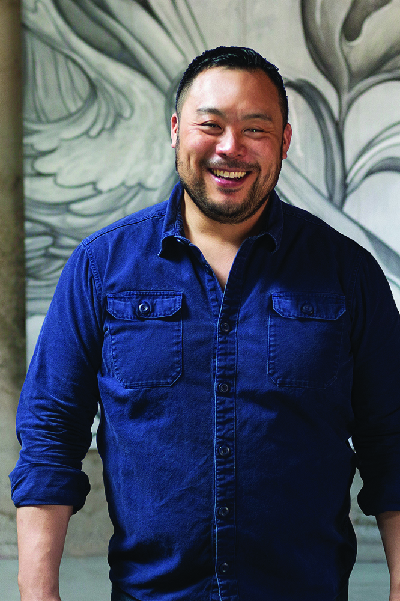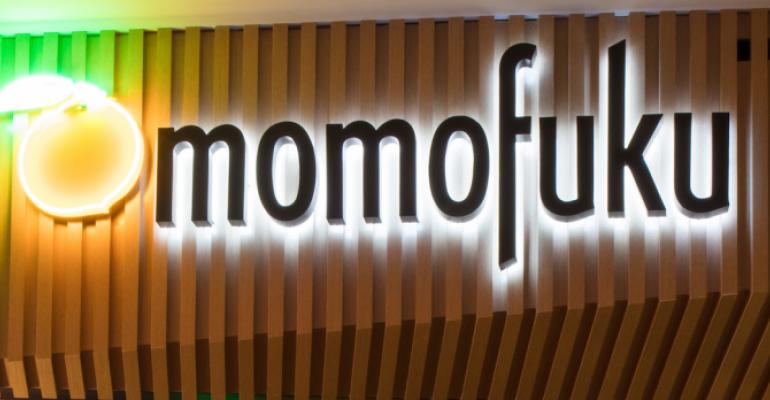David Chang’s Momofuku group has decided to close two of its restaurants permanently, and relocate another one, the chef and founder said Wednesday.
The New York City-based group, which now has 14 restaurants, is closing its only Washington, D.C., restaurant, Momofuku CCDC, as well as Nishi in New York. It is relocating Ssam Bar, which has been a landmark in Manhattan’s East Village for more than 14 years, to Manhattan’s South Street Seaport, where the group already operates Bar Wayō.
“Agonized over a million possible scenarios... at the end of the day this was the only viable option,” Chang said in an Instagram post announcing the closures.
On Chang’s podcast Momofuku group CEO Marguerite Mariscal said, “We are making the very difficult decision to basically consolidate and condense our footprint to be in a better spot to come out of this.”
On the podcast, Chang and Mariscal also addressed systemic problems not only in their restaurant company, but in full-service restaurants in general.
 “Now we kind of have to figure out where can we deploy resources and how do we make a more diversified business model that’s not just restaurants, but also complimented by these other pieces that we hope will better provide for our teams by not being so reliant on people dining within our spaces,” Mariscal said.
“Now we kind of have to figure out where can we deploy resources and how do we make a more diversified business model that’s not just restaurants, but also complimented by these other pieces that we hope will better provide for our teams by not being so reliant on people dining within our spaces,” Mariscal said.
Those other pieces include home goods and ingredients for home cooks, proceeds from which, for now, are going to the group’s Bluetape Fund, which aids employees affected by the COVID-19 crisis
The group has previously only closed one restaurant, Má Pêche in Midtown Manhattan, in 2018.
“This has been … emotional for me,” Chang said on the podcast. “Marg [Mariscal] is the decision maker and she’s looking at it for long-term and what’s best for the long term. … My instinct is always to, like, hunker down: Let’s just do this. Let’s find a way to pivot here, here and here, and we are. This is actually the pivoting.”
He indicated that one of the reasons they chose to close those specific restaurants was intractability on the part of their landlords.
He said he didn’t respect the landlords’ decision.
“I understand it, and if I was in their situation maybe I could see it a little bit differently. But there was just no give-and-take. I’m still at war with this decision. It’s not ever going to sit right with me, and at the same time I understand exactly why we need to do it.”
 Chang said Ssam Bar also was suffering from longstanding infrastructure issues, adding that the building was “crumbling,” and that he had been “literally knocked out cold” by running into low-hanging pipes.
Chang said Ssam Bar also was suffering from longstanding infrastructure issues, adding that the building was “crumbling,” and that he had been “literally knocked out cold” by running into low-hanging pipes.
Its small footprint also is an issue, he said.
“So many of the restaurants in New York City — particularly with the coming new healthcare regulations and the PPE [personal protective equipment] — it’s just going to be too hard to produce food in close quarters. And when you already have a failing infrastructure of a building. … You are literally fighting the building to make the food.”
He said they would have had to borrow $1 million to $1.5 million to refurbish Ssam Bar.
As difficult as it was to close the restaurants, Chang said it underscored the need for restaurant companies to rethink their businesses.
“The pain and agony and all of the terribleness that’s come out of this has made me realize … we’re never going to do this ever again. We cannot be this vulnerable ever again.”
That means diversifying out of restaurants and creating different revenue streams, such as products for use in people’s homes, meal kits and pantry items.
Mariscal agreed, saying that the COVID-19 crisis exposed “preexisting conditions” in the restaurant industry.
For the past several years, Chang and other restaurant operators have been sounding alarm bells that rising costs and shrinking margins are making full-service restaurants increasingly difficult to run profitably.
Contact Bret Thorn at [email protected]
Follow him on Twitter: @foodwriterdiary





